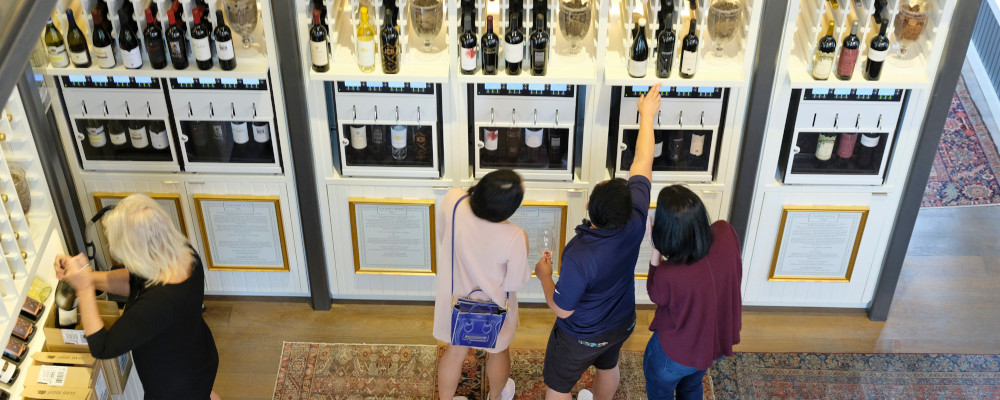I sporadically organize an amateur wine club with a small group of my friends and neighbours. We go in on a bunch of cases of wine and redistribute the bottles among ourselves. I proposed the club to my friends out of enlightened self-interest. By way of the club, a handful of us get to try wine from a number of cases while only paying for one.
The logistics of sharing the wine keep our numbers small, but I sometimes imagine what would happen if the club got bigger. Like a lot bigger: just under 10,000 members. At that size, we could cut out the middlemen and buy directly from producers from anywhere in the world. And our orders would be big enough to cut some pretty good deals for ourselves.
That is, actually, pretty much how the Opimian Wine Club works. With chapters in every province, Opimian is a professional but non-profit, member-driven organization that imports wine directly into the country. (They also work directly with Canadian winemakers.) Founded in 1973 in Montreal as the Opimian Society, it’s been doing it for half a century. But as old as this niche player in the Canadian wine scene might be, the way it works seems to be particularly suited to consumer preferences in the post-pandemic wine market.
Opimian’s driving founders were two Brit expats, John Sambrook and Ken Christie MW, with experience in the London wine trade. They were underwhelmed by the lack of selection and the difficulty in buying many wines in their adopted homeland. They correctly surmised that if they wanted to drink well without paying through the nose, they’d have to go get the wines themselves, as it were, and recruited a group of like-minded friends to generate enough orders to make it a go.
Opimian continued to grow through the last quarter of the twentieth century as a bit of an anomaly in the wine trade. To be fair, most Canadians just weren’t that into wine until the 1990s. What was for sale at the local provincial liquor retail monopoly was deemed adequate. When the internet and dot com arrived, online ventures started up to varying degrees of success, but unlike Opimian, they marked up for profit, and deals were few and far between.
The COVID pandemic lockdowns were the watershed moment for wine clubs in Canada. While the liquor stores were deemed an essential service and stayed open, the other main channels for selling wine were not. Provincial governments loosened rules around selling wine directly to consumers, and importing agents and wineries began setting up their own clubs, often offering mixed cases.
The trouble with the agency and winery clubs was that they, unsurprisingly, kept their offers to their own products, which naturally were priced with profit in mind. Brick-and-mortar bottle shops, which offered restaurant wines directly to consumers, could offer a wider array of products, but had to mark up on the mark-ups, and remained pricey. The consumer wine-buying landscape had changed and opened up, for which all winos were grateful. We just wished we could find a few bargains in the mix.
Mike Howe thinks Opimian is well poised to serve Canadian wine buyers in this new landscape, where ordering wine to the door has become a regular thing. Howe, who has a background in wine event marketing, was hired last year as Opimian’s head of growth, and he says he’s looking for new members among the “wine knowledgeable or wine curious”.
Full disclosure: I know Howe from being invited to wine industry events he helped manage on behalf of premium wine regions in his last job. When he asked me if I wanted to go see Opimian’s Ontario events centre at the Dymon Wine Cellar storage facility in the western Toronto suburb of Etobicoke last week, I gladly accepted, curious to see what the twenty-first-century version of Opimian was up to.
The Dymon facility is another new feature of the wine consumer landscape in Canada. Collectors can keep wine in purpose-built “lockers” there and bring friends, or perhaps corporate clients, there to enjoy the wines while using the dining and lounging facilities. Importing agents are increasingly using the facilities in the same way, and the Dymon one has the advantage of being close to the airport and easily accessible to GTA’s highway system. When we arrive, the main dining area is set up and filling up for a Super Tuscan tasting for restaurant buyers.

Howe reminds me that Opimian is also an importing agent, just one whose customers are also its owners. He’s set up a locker for Opimian wines at Dymon to host events for his clients, who are also his members. He explains, “We do the marketing, sales, and order collecting for them, but we also build community and make personal connections to the wines,” adding, “Many of our members get to know our producers personally through our in-person experiences, which can also include travel.”
Howe gives me the numbers on the size and breadth of the club: about 8,600 members buy from over 200 producers in 17 countries. Opimian wines are exclusive to the club in Canada, although an increasing number of restaurants are joining to get access to the competitive pricing. Wines are selected principally by a committee of three Masters of Wine.
It’s hard not to see Opimian as the once and future model of fine wine in this country. Outside of Alberta, it seems unlikely the provinces will ever give up their retail stranglehold to the private sector in any significant way. The liberalizations that came with the pandemic have still come attached with regulatory strings that keep prices artificially high. The way around this seems to be consumer ownership; a true club.
It’s even more unlikely that the provinces will lower inter-provincial barriers so that wine can be imported and marketed nationally. Opimian understands that a producer an ocean away is much more interested in entering a market of 40,000,000 people than ten or thirteen with a lot less. Again, maybe consumer-driven-and-owned buying will finally give Canadian winos the purchasing power they deserve.
Recommended for You

Malcolm Jolley: Cool Chardonnays for warm days

Malcolm Jolley: The LCBO strike was a spectacular misstep

The Weekly Wrap: The Assembly of First Nations is not worth the Conservatives’ time

Malcolm Jolley: Doug Ford is right. The LCBO has long outlived its purpose











